|
King Street
Fordwich
01227 710661
http://www.homecountiespubs.co.uk/georgeanddragon/
https://whatpub.com/george-dragon
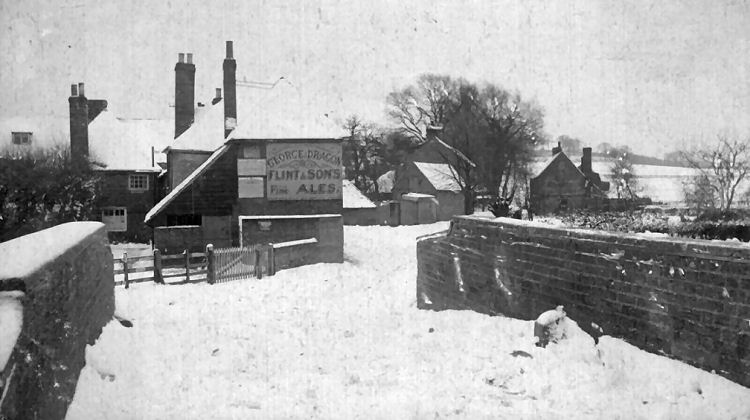
Above photo, circa 1899, kindly sent by Rory Kehoe. |
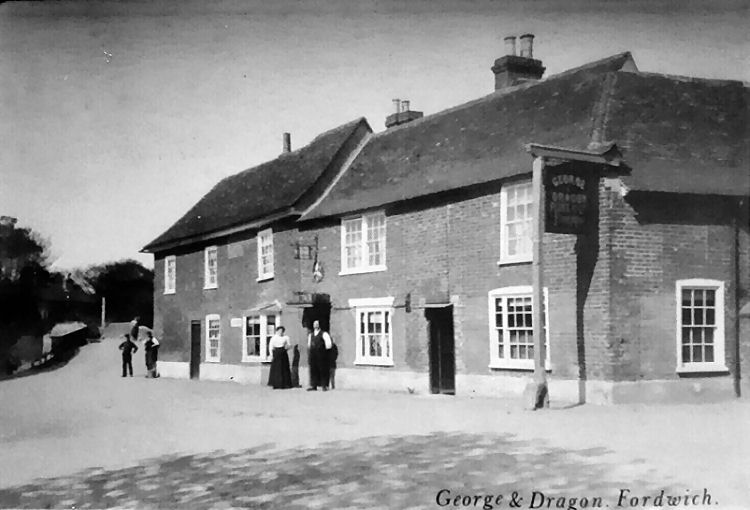
Above postcard, circa 1900, kindly sent by Rory Kehoe. Probably
showing licensee George Swain and his wife. |
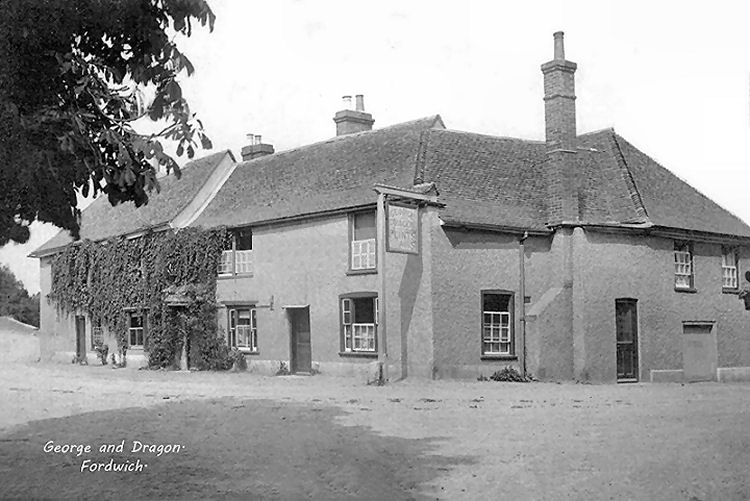
Above postcard, circa 1910. Kindly sent by Rory Kehoe. |
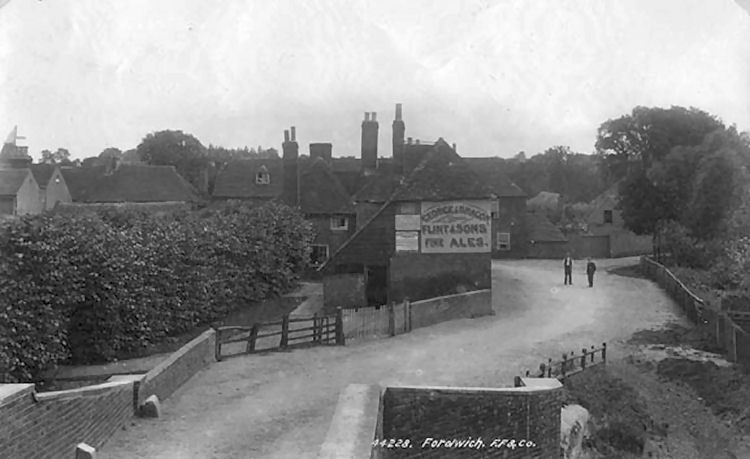
Above photo, "George and Dragon," Fordwich, 1912.
|
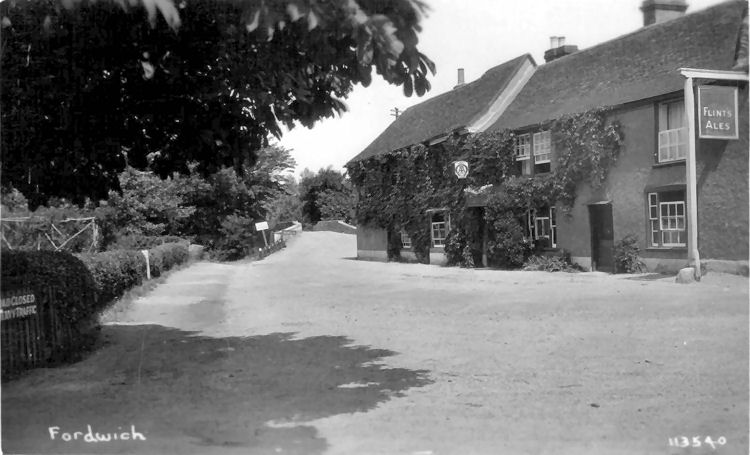
Above photo, circa 1920. Kindly sent by Rory Kehoe. |
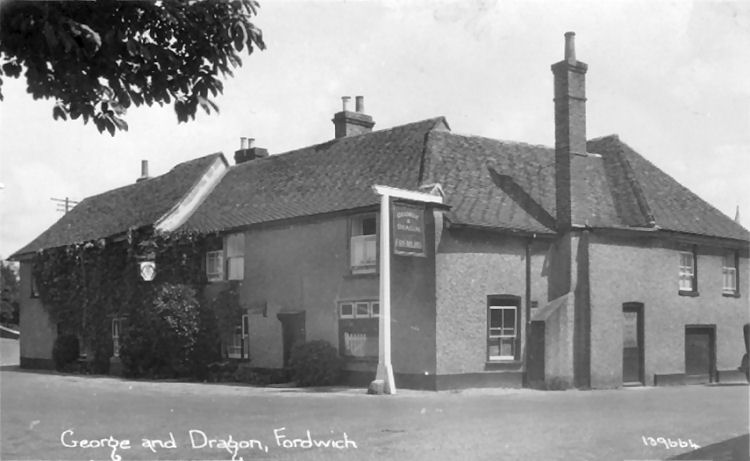
Above postcard, circa 1948, kindly sent by Rory Kehoe. |
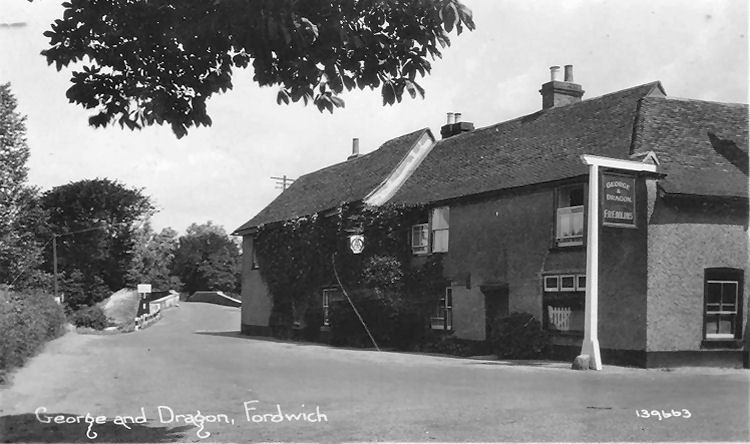
Above postcard, circa 1950, kindly sent by Rory Kehoe. |
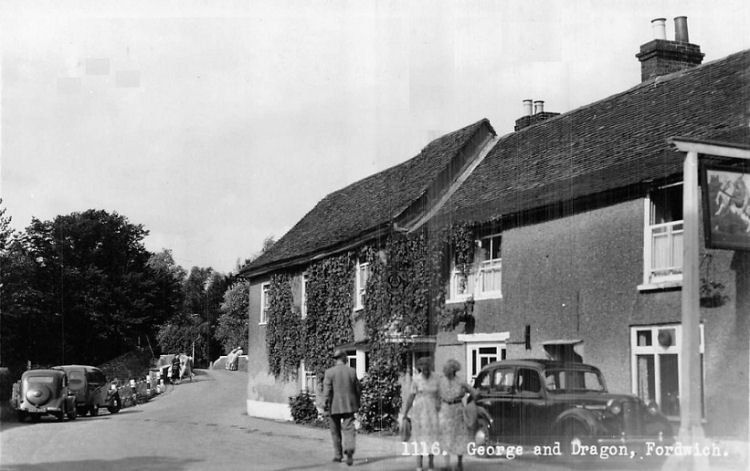
Above postcard, 1953, kindly sent by Rory Kehoe. |
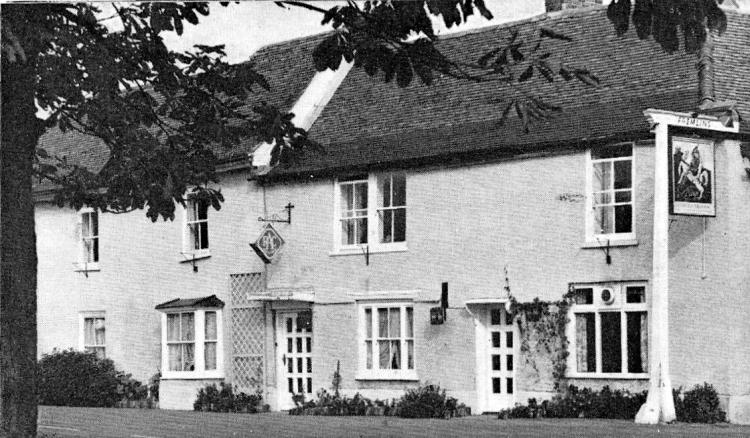
Above photo, circa 1959, kindly sent by Rory Kehoe. |
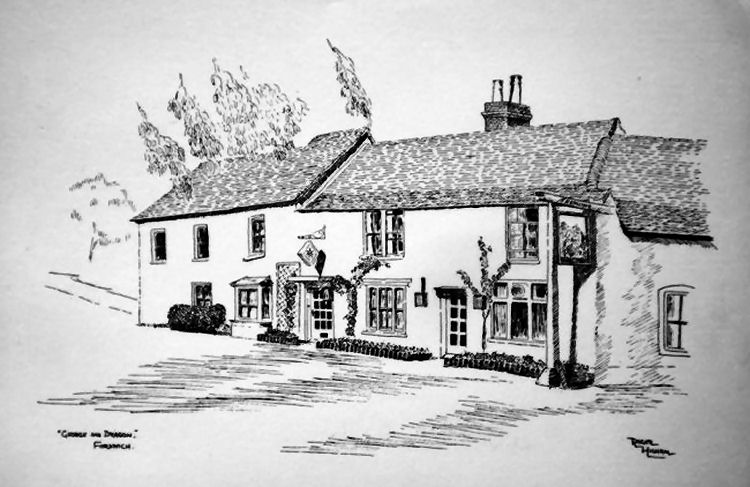
Above postcard, date unknown. |
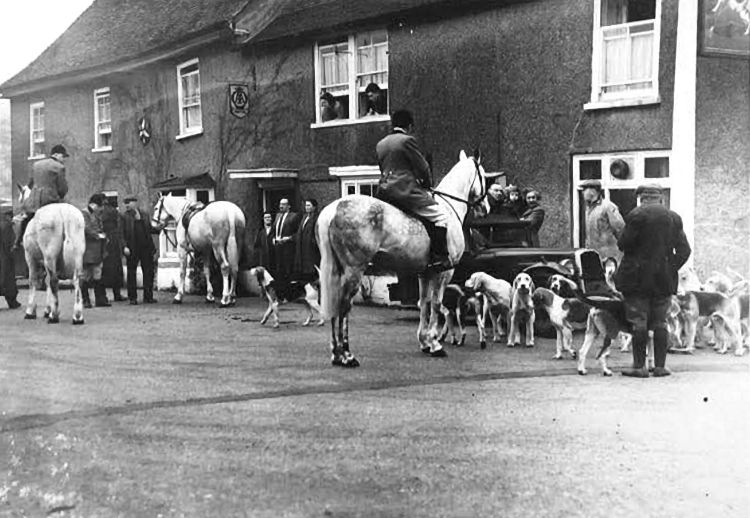
Above photo, date unknown, showing licensee Ernie & Emma Frost outside
the door. |
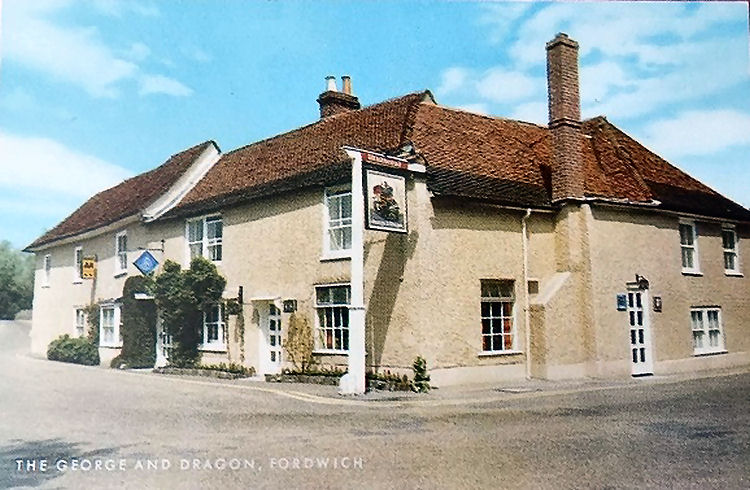
Above postcard, 1975, kindly sent by Rory Kehoe. |
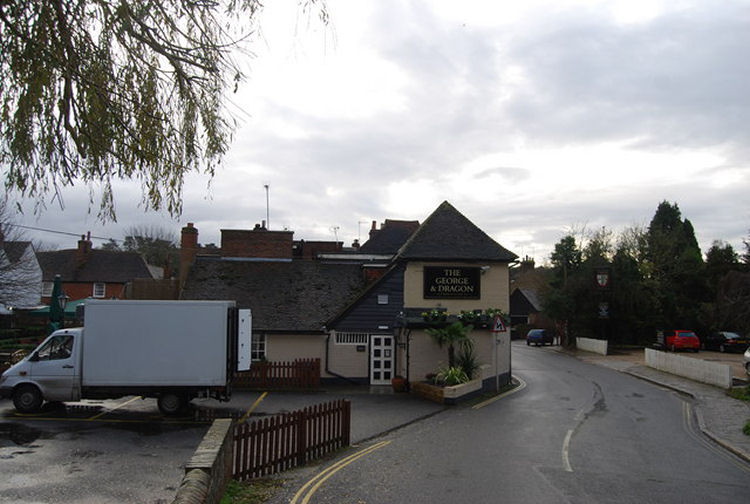
Same photo, 2009, photograph by Nigel Chadwick, licensed for reuse
under the
Creative Commons Licence. |

Above postcard, date unknown, kindly sent by Mark Jennings. |

Photograph by Nick Smith, also
under the same licence.
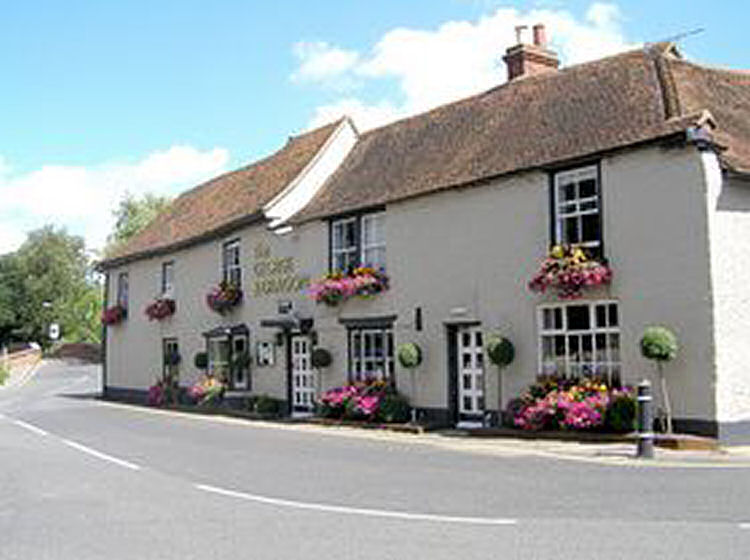 |
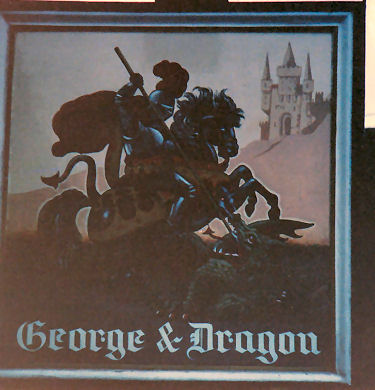 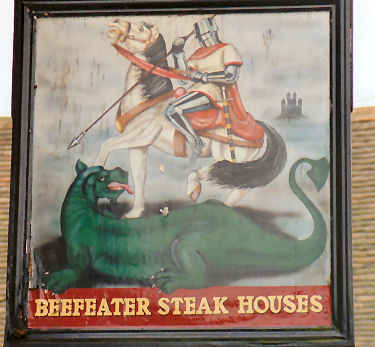
George and Dragon sign left, July 1974, sign right, July 1991.
Above with thanks from Brian Curtis
www.innsignsociety.com |
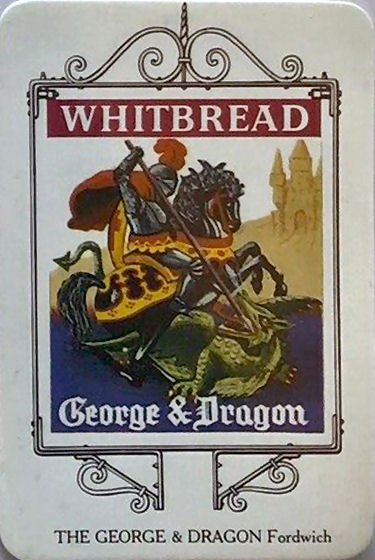
Above Whitbread card, 1973 and series unknown. |

Above taken from their web site (Click
here)
|

Above postcard, date unknown. |
I have found reference to a "Royal
George" in Fordwich that was put up for auction in 1786, perhaps it
changed name to this pub.
|
From the Kentish Gazette, 21 January 1840.
DEATH.
Jan. 13, Mr. Bourne, landlord of the "George," Fordwich, formerly a
butcher of Canterbury.
|
|
East Kent Times 11 June 1859.
FORDWICH. PETTY SESSIONS. - June 2.
Mr. John Andrews, landlord of the "George and Dragon," Fordwich, was
summoned for having his house open for the sale of beer and spirits at
an unlawful hour. The defendant pleaded guilty. It appeared that on
Sunday morning, the 22nd of May, about a quarter before nine, Sergeant
Mayhew, K.C.C. visited the house. The door was open, and a horse and
cart was standing at the door. He found five persons in the parlour,
three of whom were drinking ale and two rum and milk. The landlord
stated that the guests came from Margate, but the fact was they were
tradesmen of Canterbury, who had previously been occupied in birds'
nesting and gathering lilies. The bench found defendant 5s. and 10s.
costs.
|
|
From the Kentish Chronicle, 30 March, 1861.
THE WAY TO GET RID OF A LEGACY.
Cephas Keeler, of Littlebourne was brought up and charged with being
drunk and disorderly in High-street on Saturday evening. It appeared
that the defendant had £20 in his possession on Saturday morning, which
amount he had received on account of a legacy left him by a relative;
and it transpired that he had been robbed of a large portion of the
money, as about £9 could not be accounted for. Keeler was discharged on
payment of expenses.
A man named John Bradley was then placed in the dock on suspicion of
having robbed Keeler of his money. Keeler stated that he and the
prisoner came into Canterbury together on Saturday morning, and he
(Keeler) got a £20 note changed at the bank. He spent £2 12s. 10d. on
clothes, and put the balance in a bag, and he and Bradley afterwards
went to different public houses drinking. In the evening, about
half-past seven o'clock, they went to the “George and Dragon,”
High-street, and at that time he had sixteen sovereigns in the bag. The
prisoner and other persons were in the room. They got some rum, after
which he could recollect nothing further. On Sunday night he was at the
police station, and the prisoner said to him, “Here is the bag and money
you gave me last night,” The bag which the prisoner thus gave him
contained £7.
Mr. Gibbs, landlord of the “George and Dragon,” said he remembered the
prosecutor, the prisoner and a person named Taylor being at his house on
Saturday night, and he served the prosecutor with some rum. The
prosecutor got out his bag and money to pay, but could not find, as he
said a half-sovereign. The prisoner took the bag and found a
half-sovereign, out of which he (Mr. Gibbs) took pay for the rum, and
gave the difference in change. He did not know whether the prisoner gave
the bag buck to the prosecutor. Mrs. Gibbs stated that she saw the
prosecutor leave the house and on getting into the street he was
apprehended by the police for indecent conduct. After he had gone she
gave the prisoner change for a sovereign. The after movements of the
prisoner could not be clearly traced, and the man, Taylor, who was with
him at the “George and Dragon” was reported to be in the country. The
prosecutor said he did not think the prisoner intended to steal the
money but that being drunk he had got rid of it without knowing exactly
how. The court was then cleared for a short time, and on the
re-admission of the public, the chairman said it had not been clearly
shown that the prisoner acted with any felonious intent. The bench would
therefore give him the benefit of the doubt and discharge him. As for
the prosecutor he would have to put up with the loss of his money.
|
|
Canterbury Journal, Kentish Times and Farmers' Gazette, Saturday 8 September 1866.
St Augustine's Petty Sessions. Saturday. Annual Licensing Day.
The county Magistrates renewed the publicans' spirit licence today.
Applications were also heard for new licences, and, as well be seen by
the following list, the majority of these were granted.
Licences granted, George Elliot, "George and Dragon," Sturry.
Although this is addressed as Sturry, I
believe this is actually the pub in Fordwich.
|
|
Kentish Gazette, 28 March 1876.
FORDWICH INQUEST.
On Saturday last, Mr. T. T. Delasaux, acting as the deputy for Denne
Denne, Esq., Mayor and also Coroner for the borough of Fordwich,
held an inquest on the body of William Dibley, aged 4 years, son of
a porter on the South Eastern Railway, at Chartham. About nine
o'clock that morning, as Mr. Mountford, landlord of the "George and
Dragon Inn," was walking along the bank of the river Stour, he
observed something floating in the water. he took a boat and went to
the spot, where he found the body of the deceased, who was last seen
alive playing alone on a bridge which spans the river at Chartham,
on the 22nd of February last. He was missed on that day, and it must
have happened that the body was washed down the river from thence to
Fordwich, going through Canterbury and passing several mills, during
the recent floods. There was nothing to show how the deceased got
into the water, and the jury returned a verdict of "Found drowned."
|
|
Whitstable Times and Herne Bay Herald 15 October 1898.
At the Bridge Rural District Council Meeting it was said that a letter
had been received from Dr. Robinson stating that he had analysed a
sample of water taken from the well at the "George and Dragon," Fordwich,
and found it so contaminated as to be unfit for drinking purposes.
The
usual order for closing the well was made.
|
|
From the Whitstable Times, 22 February, 1902.
FORDWICH.
The Fordwich Church Bell Ringers’ Club Supper, was held at the “George
and Dragon Inn,” Fordwich, on Wednesday evening, February 19th.
|
|
From the Dover Express and East Kent News, 19 February, 1909.
EAST KENT PUBLICAN'S SUICIDE
A body which was found on the railway near Knockholt station on
Saturday evening, was identified as that of William Watson, aged 56
years, who for some years kept the "George and Dragon," Fordwich near
Canterbury, and last October moved into the Commercial Hotel, Gravesend,
the trade of which disappointed him. On the body were two letters
showing that he was very jealous of his wife. At the inquest it was
proved that these were based on a pure delusion. He had, however, been
very queer in the head lately, and left home after threatening his wife
with a gun. She closed with him and pulled the trigger to discharge it,
and the shots went into the wall. - The jury returned a verdict of
"Suicide whilst of unsound mind."
|
|
Whitstable Times and Herne Bay Herald 26 August 1933.
DANCE AND CABARET. IN A "GERMAN BEER GARDEN" AT FORDWICH.
The lawn of the "George and Dragon" Hotel, Fordwich was transformed on
Saturday night into a typical German beer garden, when a dance and
cabaret, organised by the Misses Bailey, was held, in aid of the Kent
and Canterbury Hospital New Building Fund. The lawn was brilliantly
illuminated, and the German effect was admirably produced by the
upturned beer barrels which served as tables, and the variety of sausage
dishes which were served! This effect was heightened by the "English
Spoken" notices prominently displayed on the wall. Dancing was indulged
in to music provided by Norman Steele and his band.
Two exhibitions of dancing were given by Miss Eunice Gardiner and her
talented pupils during the evening. In the first display the numbers
included "Love it the sweetest thing," by Margaret Couchman and Joyce
Webb; the Dance of the Fan, beautifully contributed by Miss Eunice
Gardiner; "Breathing on the Window," by little Valerie Swinnard, who
gave an effective rendering of the vocal part; and an acrobatic
trio-Sheila Huntley, Joyce Webb and Joan Welldon, who executed some most
amazing turns, etc. The second display opened with a soldier number, by
S Huntley, T. Webb, and Margaret Couchman, and this was followed by
"Don't Say Goodbye," by Miss Gardiner; a hornpipe solo, by V. Swinnard;
"Shepherdess," by S. Huntley; and "Please Don't Mention It," by M. Couchman and T. Webb. The performance concluded with an acrobatic solo
by V. Swinnard.
The lighting arrangements were carried out by Mr. Roberts, of Herne Bay,
and Mr. Brett lent an engine for this purpose.
|
|
Whitstable Times and Herne Bay Herald, Saturday 7 December 1935.
Extensions at Christmas. In St Augustine's Division.
Licence houses in Whitstable and Herne Bay, where applications have been
made, are to remain open for an extra hour on the night of December 24th
and December 26th for 2 hours on New Year's Eve.
In the case of the "George and Dragon," Fordwich, similar extensions
were granted as in the case of Whitstable and Herne Bay.
|
|
Whitstable Times and Herne Bay Herald 13 August 1938.
CHARTHAM. DEATH. BAILEY.
On August 7th, 1938, Frederick Charles Bailey, "George and
Dragon" Hotel, Fordwich, passed away, aged 70 years.
|
|
Saturday 12th November 2005. Ghost Search.
My researchers were unable to find any documented history on The George
& Dragon, yet have unearthed a little history on Fordwich itself.... The
George and Dragon was built around the 15th century and lies in the
village of Fordwich. Fordwich was described in the doomsday book as a
'small burgh', one of only seven boroughs in Kent. By the 11th century
Fordwich became self governing. In the village you can find a ducking
chair and it is believed that women accused of witchcraft were ducked
here. In 1944 The George & Dragon was used externally for a movie called
'Canterbury Tales', the main star and film crew stayed at The George &
Dragon whilst filming took place. Within The George & Dragon energy was
found to be high, not just due to the residential Spirit, but ley lines
are also to be found running through the property, which for Mediums, is
great as Spirit have an on line supply of energy to work off. I was also
intrigued to hear about a cupboard that house's a public telephone (now
used as a storage space, phone still in situ), there are times when this
phone rings...yet the phone is not connected?! Throughout this building
Spirit roam quite freely, in the kitchen I was to meet a young lad of
thirteen who thought it funny to run up and down the kitchen itself
banging and moving objects, staff have reported they feel an 'energy'
pass by and that equipment and appliances do have a 'mind of their own'.
In the dinning room I was met by a gentleman who stood 5' 8" to 5' 9" in
height, he was a military man who rode on horse back. This man brings a
sadness with him, he told me he took his own life by falling on his
sword the reason as yet, unknown, but he gave me the year of 1845. Still
in the dinning area there are an additional three Spirit's, one male,
two female. I could clearly feel that poltergeist activity takes place
here, to which the staff agreed things have a habit of moving and guests
have reported seeing a 'ghost' in the area. In the rooms upstairs, to
which we have full access to, you will find a number of male energies.
In one of the self contained flats you will find a male energy who likes
to act tough, he gives off energy as being strong and powerful, we shall
see on the night just how powerful he is! This is a great place to
explore for Spiritual evidence, lots of active Spirit who all seemed
very eager to step forward and be noticed, I anticipate a productive
night whilst staying at The George & Dragon.
The Investigation Report
If I said that we as a team enjoyed this investigation I would be a
liar. We found that most of the guests were hard to work with, so many
had closed minds and were despondent before the investigation started.
Despite what you may think this does have a detrimental effect on
Spirit's ability to step near, negative thinking builds up a barrier
that Spirit find hard to over come and Mediums to work through. We felt
so much potential evidence was lost.
We welcome the non believer, all we ask is you have an open mind to the
possibility of...
This report will be short, for myself there was only one room that
offered 'something', this was due to Spirit thinning guests numbers down
leaving those with 'open' minds.
In the flat above The George & Dragon I took a small number of guests to
one of the back rooms as the energy felt very high. There were
originally six guests, who accompanied me, and we all found the room
began to get darker as we opened up to work. This occurred at the same
time three male energy's joined us in the room. The guests with me had
their arms moved by Spirit and the atmosphere changed rapidly. Several
of the guests had to leave the room because they felt scared. One of the
male energies said “Then there were five”, (he indicated to the number
of guests left in the room). He continued counting down each time a
guest vacated the room. I felt 'something' in my hair and lifted my hand
to touch it; a number of guests saw lights around my head at that time.
It was also pointed out by the guests that the light from the two way
radio appeared to be turning off and on, as if someone was walking in
front of it. The three male energies were afraid to cross over for fear
of retribution, they were criminals and had abused young boys/men
alongside murdered a number of people. I was then shown a scene where a
man (who had discovered what they were doing with young boys and
threatened to report them to the Police) was forced in to a barrel to
which the lid was then nailed down, leaving the man to die slowly. I was
given a date and an area to which this had taken place (not revealed due
to sensitivity). The guests were very aware of intense cold spots
throughout this description that I was relaying. Two of my guests (one
male, one female said they could feel an energy coming in close to them
but then seemed to back off. I asked the Spirits why they did this, to
which the male energies said they didn't like 'the law' (as in people).
It turned out that both guests worked for the Police!
Only two surnames were caught on cam 'Raymond's' and 'Richmond', the
tape ended before the third was given: to which I cannot recall the
surname given, sorry. Throughout our time in this room lights were seen
darting about the room, intense cold spots were felt, drafts blew past
people and a heavy atmosphere was also felt.
Table tilting and glass movement were good.
Donna (Ghost Search Uk Paranormal investigators).
http://www.ghostsearchuk.co.uk/
|
The Hotel was operating as a Beefeater Steakhouse in 1987; there was an
alehouse on or near this site over 500 years ago, at a convenient spot close
to the ford and town quay. In the early part of this century the toll rights
of the narrow Fordwich bridge were leased to the licensees of the pub for
three guineas a year.
The "George and Dragon" pub was named after St George, the patron saint
of England. The legend of George and the dragon was a myth bought back by
the crusaders, and the earliest known depiction of the story dates from the
eleventh century.
Fordwich, first mentioned in 675AD as Fordewicum (meaning ‘inhabited
place beside the ford') has been home to the George and Dragon since around
the 15th Century. The town has a unique and vibrant history.
In Roman times and up until the Middle Ages, Thanet was an island,
separated from Kent by a channel some miles wide called the Wantsum (twinned
with an estuary in France called the 'Avsum). An arm of the sea came as far
as Canterbury and was navigable as far as Fordwich. The port no longer
exists as the estuary became silted up over time, and by the late 18th
century, the geography of the area had changed dramatically. As a
consequence of its position at the head of the estuary, controlling crucial
transport links, the town has always had an importance beyond its size.
In the Domesday book, Fordwich is described as a ‘small burgh', one of
seven such boroughs in Kent. By the 11th century it became self governing
and freed from paying national taxes, in return for providing ships and men
to fight for the crown.
As part of the self-governance of Fordwich, in the late 13th Century, a
substantial document delineating the customs and laws of Fordwich was
produced, called the Fordwich Customal.
Later the provision of ships was changed to the payment of money, and
Fordwich to this day still pays its Ship money of forty old pence to its
Head Port of Sandwich, at a ceremony held annually in the Guildhall.
Until the middle ages Fordwich was known as ‘The Port of Canterbury'
(more accurately, the port for Canterbury), because it was indeed a port. It
sat at the head of the estuary of the River Stour, and was both tidal and
navigable. The town owned the quay and the crane, and derived income from
duty on imported goods and the hire of the crane. Indeed Canterbury
Cathedral passed through the port stone-by-stone from Caen in France as boat
cargo, on its way to its final home. The crane can still be seen folded back
against the back of the town hall, where it would have been ready to swing
out over the river to unload cargo.
A further use for this crane was to raise and lower the Ducking Chair,
which can also be seen in the town hall. This was an instrument of
punishment whereby female scolds and gossips were dunked in the river
repeatedly to quieten their tongues.
But as we have seen, by the late 1700's the estuary had largely silted
up. Fordwich found itself stranded inland with restricted access along the
River Stour, and had consequently slipped from prosperity.
In 1800, Edward Hasted, in the History and Topographical Survey of the
County of Kent, wrote, “The town of Fordwich lies very low and unhealthy,
close to the marshes, on the southern bank of the river Stour, a lonely
place, of little or no thoroughfare. It is but small and mean, consisting of
about thirty houses and cottages. The only remains of antiquity, of its
having belonged to the abbey of St. Augustine for a great length of time
past, was a losty arched gateway, built of brick, at the entrance to their
wharf here, lately pulled down, and a small length of flint wall close to
the river. Near which is a large handsome house, belonging to the Blaxlands,
and now made use of as a soap manufactory”
By Victorian times Fordwich had become inaccessible to cargo boats, and
finally ceased trading as a port in 1830 when a railway was built linking
Canterbury with Whitstable Harbour. With an ever-beady entrepreneurial eye,
at this point the town built a narrow bridge over the river and derived
income from tolls as carts and wagons came into town. These tolls were
leased by the landlord of the George and Dragon. The charge was 1d for a
cart and 2d for a wagon, and the toll notice board may still be seen in the
Town Hall.
In 1944, Fordwich and in particular the George and Dragon became the film
set for the ‘Hand of Glory' pub in the famous film ‘A Canterbury Tale'
directed by Michael Powell and Emeric Pressburger. Many of the stars and
film crew stayed at the George and Dragon whilst filming took place, and
film buffs regularly visit the pub to this day.
The George and Dragon is said to be home to ‘The Lady with the Green
Hat', who is believed to have haunted the building for as long as anyone can
remember. She is thought to wander the pub and grounds, always wearing her
green hat. And whether it has anything to do with our ‘Lady in The Green
Hat' or not, the story goes that the telephone downstairs, although having
been disconnected many years ago, still rings at times.
LICENSEE LIST
THORPE Edward 1826-32+
  
BROWNE/BOURNE Thomas to Jan/1840 dec'd
MACE Greensreet 1847+

HOOPER J 1855+
AUSTEN Thomas 1858+
ANDREWS John 1859+
GIBBS Mr 1861+

ELLIOT George 1866+
MOUNTFORD John 1874-76+
MOUNTFORD Anne Mrs 1881-91+
 (also coal merchant age 56 in 1881
(also coal merchant age 56 in 1881 ) )
BROOKER George Swain 1899-1903+ (age 31 in 1901 ) )
 
WATSON William ????-????
BAILEY Frederick Charles 1911-Aug/38 dec'd (age 43 in 1911 ) )
 
FROST Ernie & Emma ????
https://pubwiki.co.uk/GeorgeDragon.shtml
 From the Pigot's
Directory 1826 From the Pigot's
Directory 1826
 From the Pigot's Directory 1828-29 From the Pigot's Directory 1828-29
 From the Pigot's Directory 1832-33-34 From the Pigot's Directory 1832-33-34
 From
Bagshaw Directory 1847 From
Bagshaw Directory 1847
 From the Post Office Directory 1882 From the Post Office Directory 1882
 From
the Kelly's Directory 1899 From
the Kelly's Directory 1899
 From the Kelly's Directory 1903 From the Kelly's Directory 1903
 From the Post Office Directory 1913 From the Post Office Directory 1913
 From
the Kelly's Directory 1934 From
the Kelly's Directory 1934
 Kentish
Chronicle Kentish
Chronicle
|


















